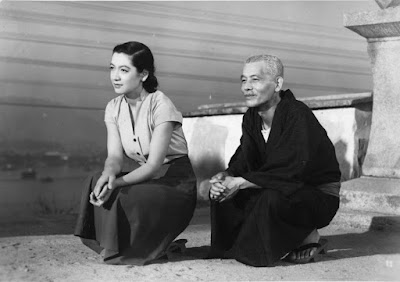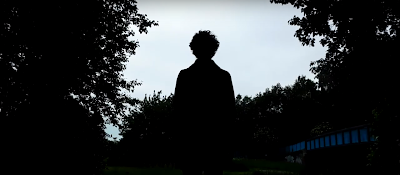Tokyo Story
Tokyo Story - The Poetry of Life
"Isn't Tokyo vast?
Isn't it? If we were to get lost, we might never find each other ever again."
An elderly couple looks on to the changing, industrial landscape of a growing new city, rising like a phoenix - a world moving past them, a world they can no longer recognize. The world is constant change - this is the natural state of things. And Yasujirô Ozu shows us a reflective view of the changing Japanese society in post-WW2 Japan, telling a simple, intimate, and humane story that is timeless and universal. This film is about the poetry of life, and this film is poetry - the simplest, most compassionate poetry there is. This film is life itself.
In this story, we follow an elderly couple, Tomi and Shukichi - played by Chieko Higashiyama and Chishû Ryû, respectively - from Onomichi, a provincial town in southern Japan, who visits their adult children in Tokyo. Before going, they are filled with hope and expectations. They boast proudly about their son's accomplishments - he's a successful and established doctor. They are looking forward to spending time with their children and to have a feeling of fulfillment, to have a sign that they did everything right when raising them and that everything will be okay. However, when they arrive in Tokyo, they find their children too busy and preoccupied with their lives to pay any attention to them - they have their own lives, their own children. They no longer need them.
Ozu doesn't depict this as a reprehensible behavior or as a sign of cultural decadence. He doesn't make any judgments of this kind about these people we observe. And that's what is so beautiful about this groundbreaking masterpiece. We watch the life of this family unfold before our eyes as we look from a corner of the room or from the opposite end of the corridor, as voyeuristic spies - not wanting to intervene in these people's lives yet drawn to them. It's both intimate and distant. It's life as it is - in its rawest form. We are simply shown how this family inevitably changes - as does society. And I have never watched such a subtle vision or have ever been so moved by such simplicity.
In Tokyo Story we see life unfold. Children become parents and their lives come to a close. It's real life that is depicted in it. There is no glamour, there are no heroes, there is no comedy, there is no tragedy. It's just how life is - and that is the only thing that doesn't change in our world. Change is the only constant in life. The parents worry about their children and grandchildren because they know they won't be there to see how they turn out in the end. "By the time you become a doctor, I wonder where I'll be", says Tomi to her grandson, in one of the most moving moments in this film.
All throughout Tomi and Shukichi's stay in Tokyo, their children don't give them enough attention and value. Their parents are treated as a mere nuisance in their busy lives. They have their own jobs and children. The only person who makes an effort to spare time to be with them being their daughter-in-law, Noriko - played by Setsuko Hara, in one of the most poignant and subtle performances I have ever seen in film - who is the widow of their late son who died in the war. Noriko is one of the most interesting characters in Tokyo Story. She is one of those people who are truly good deep in her heart yet thinks so little of herself. She refuses to recognize her goodness even when both Shukichi and Tomi tell her that. And I highly identify with her, because I am always thinking of myself as a selfish and mediocre person, even though people say otherwise.
Most films capture life with a filter - either a romantic or a fatalist one. Ozu doesn't do that. In Tokyo Story, you see life as it is. It's the epitome of realist art. It's contained and intimate. There is no affectionate or forgiving close-up because there is no such thing in real life. Life is neither forgiving nor glamorous. Tokyo Story portrays life in its full realism and disappointment. There is no "happy ending", there's just the passing of time, like a river. And life. There is only life.
"Isn't life disappointing?", asks Kyôko, the youngest daughter. "Yes, nothing but disappointment" answers Noriko, smiling.




Comments
Post a Comment